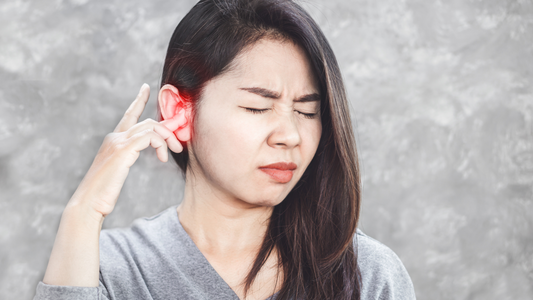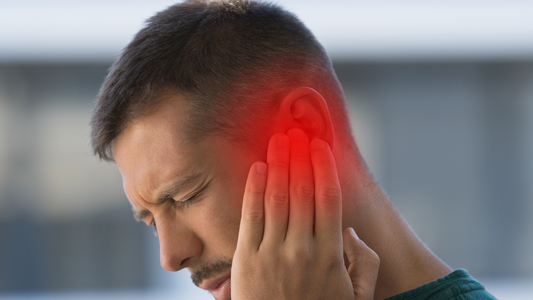Why do your ears suddenly start ringing? You're sitting there, and out of nowhere, a ringing noise starts up, but it's just in your ears, not an actual bell. It's frustrating. This sound, known as tinnitus, could be a way your body's telling you something's up. It's like when your socks leave an indent on your leg after you've been wearing them all day.
We're here to untangle the possibility of a pinched nerve causing that relentless ringing in your ears. No need to worry about complex medical terms; we'll go through it together in plain language. Wondering if it's related to your nerves? By sticking around, you might just uncover the insights you've been seeking.
Understanding Nerve Compression
Think about that annoying sensation when your shoes are too tight, except this time it's happening inside your body where nerves get squeezed. Medically speaking, it's like obstructing the flow in a small tube, but with nerves. When they get compressed, their messages might get jumbled or not sent at all. This can happen anywhere depending on the nerve affected.
Someone might start feeling sudden sharp pains or numbness. It could be a pinched nerve talking. It's not only an issue for older people; youngsters can experience it too, like waking up with a numb leg. Often, your body hints at these issues early on. If you notice an ache that keeps moving around, likely, a nerve needs some space.
Rest or a few adjustments might clear up a pinched nerve. But sometimes, you'll need a doctor to make sure it doesn't turn into a bigger problem. Catching those signs early lets you take care of it and return to your daily pleasures without annoying disruptions.
Understanding Nerve Compression
Feeling like something's not right with your body? Like a part that just won't wake up or a sudden jolt of pain when you reach for the coffee pot? That could mean a nerve in your body is getting squeezed. It's not something you can see, like a foot in a too-small shoe, but you definitely feel it.
If you're having bursts of sharp pain, unusual tingling, or muscles that seem to be slacking on the job, it might be a pinched nerve at play. And it's not just something the older crowd has to watch out for – even the young ones can wake up with a dead arm or leg. Usually, our bodies try to give us a heads up with these symptoms.
These little warning signs – an ache here, a numb patch there – they're worth paying attention to. A bit of rest or a change in routine can sometimes set things right. But if the problem is hanging around like an unwelcome guest, it might be time to see a doctor. Early action is key to keeping nerve troubles from cutting into your daily joys.
What Sparks a Pinched Nerve?
So, what exactly causes that uncomfortable pressure on your nerves? It's not always straightforward. Take a hobby like gardening, for instance. Do it vigorously every day, and your back may start voicing its displeasure. It's similar with our nerves. Repetitive motions or staying in one position for too long can pinch a nerve, much like how soil in a pot can get packed down from constant pressing.
What Else Contributes?
Your physical changes matter as well. Gaining extra pounds is like putting more weight on a shelf; eventually, the shelf—or in this case, your spine—starts to feel the strain, potentially squashing a nerve. And it's not only about weight; anything that temporarily increases pressure in your body, like a persistent cough or a sneezing fit, can jolt a nerve into discomfort.
Could It Be Something Else?
Occasionally, your body's defenses do more than intended. Take arthritis, for example. It's your body laying down extra bone as a defense, which can accidentally put pressure on a nerve. Or, consider swelling from an injury or disease that pushes on nerves—it's like a room that gets too crowded, and everyone's trying to move through it. It's all quite a tight spot for those nerves.
Can Pinched Nerves Lead to Ear Ringing?
Sometimes you might hear a ring in your ears that no one else can, a bit like an odd bell in the distance. Could it have anything to do with a pinched nerve? We know nerves are the pathways that deliver sounds from the ears to the brain, but normally, they're not supposed to sound off like a ringing phone. What if a nerve gets pinched—could that lead to the buzz you hear?
Clues In Your Cervical Spine
Think of your neck as a complex roadway, with nerves traveling in various directions. These nerves don't just go to your shoulders and arms; some reach out towards your ears too. A spinal crunch can sometimes spark issues that echo to your ears, possibly triggering that stubborn ringing sound known as tinnitus. A tight neck accompanied by ear ringing isn't a mere coincidence.
Is It Really the Nerve’s Fault?
We're not in the business of blaming, but here's what we know: pinched nerves often shout out with pain or numbness, not typically with ringing. However, it doesn't mean they couldn't influence other conditions that lead to tinnitus. If the pinched nerve impacts the muscles around your ear, they might get tense and play a role. Additionally, if it tampers with blood flow, it could disturb those tiny inner ear hair cells responsible for hearing, causing them to send out their own 'signal'.
Getting to the Bottom of the Buzz
Consider the guy who worked long hours at his computer desk, wondering if the persistent ringing in his ears was connected to his sore neck. A visit to the doctor might link it to a nerve irritation in the neck. The right kind of physical therapy and changes to his sitting habits not only eased his neck pain but also toned down that high-pitched ringing.
Pinched Nerves Treatment

Dealing with a pinched nerve is all about finding relief without making more trouble for yourself. Imagine a hose with a kink in it. You’d straighten it carefully, right? That's the approach with a pinched nerve too.
Rest and Space
Taking it easy is essential. Cut back on activities that aggravate the area in question. It’s like benching a shoe that’s been rubbing your heel the wrong way.
Gentle Movements
Easing into some gentle movements and stretches can help, mirroring the careful release of a twisted hose to avoid any sudden spikes of pain.
Comfy Alternatives
Also, it could be a time to reassess your sitting arrangements. Swap out a lumpy chair for one that supports your back correctly. Improving your posture works as part of your nerve’s recovery process.
When to Call in the Pros
If your home solutions aren't quite doing the trick, don't hesitate to get professional advice. A doctor might recommend physical therapy, prescribe medication, or use diagnostic tools to get a better look at the issue. It’s like enlisting a gardener to figure out why your hose isn’t working and get it fixed.
Conclusion
Treating tinnitus when it's tied to pinched nerves involves addressing the root of the problem. You've got to tackle the condition causing the ear ringing to find some relief. It's not enough to treat the symptom alone; that would be like silencing an alarm without putting out the fire.
Delaying medical attention could lead to permanent ear damage, leaving you with constant tinnitus or even hearing loss. So, if there’s a persistent buzz in your ears, get it checked out sooner rather than later.
Experienced tinnitus with a pinched nerve? What did your doctor pinpoint as the cause, and how did you go about handling it?
Wrapping It Up: Nerves and Nuisance Noises
What's up with that random ring in your ears? If your body sends out odd signals like aches or that peculiar numb feeling, it might mean something. Sorting out why your ears ring could be as practical as changing your sitting habits or stretching now and then. If you reckon a pinched nerve is messing with your ears, trying some easy-going stretches might help do the trick.
But keeping your ears in check matters too. Small problems can turn into big hassles if left alone. Sometimes, a simple fix is all it takes, other times, you'll need an extra hand. And when that ear buzzing is as stubborn as an old coffee stain, remember, calling for backup is always a smart move. Don't hesitate to seek help if that noise lingers.
Sources & References
- Baguley, D., McFerran, D., & Hall, D. (2013). Tinnitus. The Lancet, 382(9904), 1600-1607. https://www.thelancet.com/journals/lancet/article/PIIS0140-6736(13)60142-7/fulltext
- Levine, R. A., & Oron, Y. (2015). Tinnitus. Handbook of Clinical Neurology, 129, 409-431. https://www.sciencedirect.com/science/article/pii/B9780444626301000238
- Langguth, B., Kreuzer, P. M., Kleinjung, T., & De Ridder, D. (2013). Tinnitus: causes and clinical management. The Lancet Neurology, 12(9), 920-930. https://www.thelancet.com/journals/laneur/article/PIIS1474-4422(13)70160-1/fulltext
- Bechter, K., Wieland, M., & Hamann, G. F. (2016). Chronic cervicogenic tinnitus rapidly resolved by intermittent use of cervical collar. Frontiers in Psychiatry, 7, 43. https://www.frontiersin.org/articles/10.3389/fpsyt.2016.00043/full

The Hear Well Group Research Team: Trusted Hearing Health Insights
Our experienced research team compiles hearing health data from credible, peer-reviewed sources and presents it in easy-to-understand terminology. We ensure accuracy and trustworthiness, providing up-to-date, evidence-based recommendations to enhance hearing care practices and inform our readers' hearing well-being decisions.


